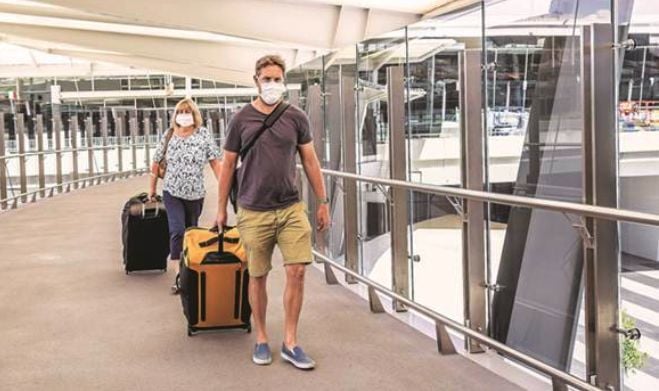UPDATE: Covid-19 visitor entry around the region

Around the region there are many countries starting to re-open their borders to allow some business or diplomatic visitors, even tourists, to enter their national borders. The situation is changing frequently and we’d urge you to contact the national embassies in your countries before making any concrete arrangements or paying money for airfares or accommodation before you clarify the situation, specific to your circumstances.
Here’s some of the latest information as we whip around the region…
THAILAND
Thailand’s Foreign Ministry has confirmed that the new Special Tourist visa will only be available to tourists from countries “deemed to be at low risk from Covid-19”. At this stage Thai officials have not identified who the low-risk countries are, but it has been reported in Thai media that the list will probably include China, Taiwan, South Korea, Japan and Hong Kong. The Thai Sports & Tourism minister has also hinted that the government would probably be admitting selected low-risk “cities”, rather than applying the policy to entire countries. None of these details are currently available.
The launch date of the STV, meant for the start of October, has been pushed back to at least October 25 after officials “postponed” a trial visit of 150 Chinese visitors on a chartered Air Asia flight to Phuket. It was meant to arrive on October 8 but mystery shrouded the arrival of the first batch of new tourists until the date passed, without a plane hitting the ground in Phuket and the Governor announcing that the Carter was pushed back until after the annual vegetarian festival is over.
The 90 day special tourist visa costs 2,000 baht and can be extended twice to give the visitor an overall stay of 270 days. It also comes with a lot of additional red tape and added costs and is being aimed at high-spend, long-stay tourists at this stage.
VIETNAM
Vietnamese officials have decided to lift a mandatory 14 day quarantine period for foreign “experts, investors, managers and diplomats” visiting the country for less than 14 days. The country’s Ministry of Health says it will allow the “pursuit of dual goals to combat disease and ensuring economic growth.”
These foreign visitors will now be exempt from the earlier 14 day quarantine at centralised state facilities “if they stay in Vietnam for fewer than 14 days”.
“However, they have to comply with all other requirements, including wearing a mask and refraining from shaking hands to prevent the spread of Covid-19.”
The visitors will also need to complete medical procedures, including a test for Covid-19 every two days. The companies and organisations that invite them into the country will need to guarantee that it, or an international insurance company, will bear any medical or other expenses “if they contract the disease in Vietnam”.
The Vietnam Government Portal has announced that the updated quarantine concession will enable the country’s industries and manufacturing sectors to bring in the necessary foreign expertise for “short stays” to supervise the installation or maintenance of essential machinery.
Last month, the Vietnamese government agreed to open a travel bubble between Vietnam and “investment partners, such as South Korea. For business people or visitors entering Vietnam for a period longer than 14 days, they will have to register at quarantine sites (hotels or the state-organised quarantine) and present negative Covid-19 certificates 3 – 5 days before arrival. Anyone testing positive will be admitted to medical centres for treatment.
“Those reporting negative results twice can switch from centralised quarantine sites to isolation at home or their place of work or a hotel until they complete their 14 day quarantine period.”
HONG KONG
Hong Kong authorities have suspended Nepal Airlines flights until at least October 17. Civil aviation officials in Hong Kong introduced the ban October 4, after several passengers travelling from Kathmandu Airport to Hong Kong Airport tested positive for Covid-19 when they arrived, despite having presented a negative test result prior to departure.
JAPAN
China will be removed from Japan’s list of banned countries from November. Along with the Chinese mainland, restrictions will be lifted for 11 other countries and regions, including Taiwan, Australia, New Zealand, Singapore, South Korea, Vietnam and Malaysia.
Japanese businesses say they are particularly keen for their staff to start travelling to China and around south east Asia, where many of their companies have factories.
International business travellers with residency status in Japan will also soon be permitted to reenter the country without undergoing the 14 day quarantine.
NEPAL
For its trekking sector, Nepalese officials have announced that it will give foreign nationals permission to enter the country for mountaineering and trekking from October 17, 2020, subject to providing a valid negative Covid-19 PCR test.
SINGAPORE
Travellers who resided in Australia for the last 14 days, except the southern state of Victoria, or Vietnam, can now enter Singapore subject to a Covid-19 test on arrival at Singapore Changi Airport. They will be exempt from serving a Stay-at-home ‘quarantine’ if their test was negative.
“Travellers need to complete an Air Travel Pass application between seven and 30 days before their intended arrival into Singapore.”
Singapore and Indonesia have also reopened borders between the two countries for essential business and official travel. The new ‘green lane’ will start from October 26.
SRI LANKA
Entry to Sri Lanka is currently prohibited for all non-nationals. A 14 day quarantine is mandatory for anyone else travelling to Sri Lanka, followed by another 14 days self-isolation at home.
The situation is being updated by governments almost daily and we’ll bring you all the latest information about borders re-opening around the region at thethaiger.com
SOUIRCE: TTRWeekly.com
Latest Thailand News
Follow The Thaiger on Google News:


























